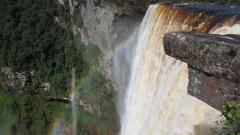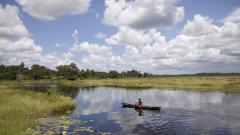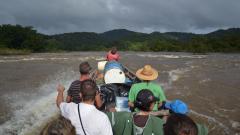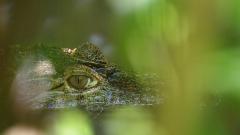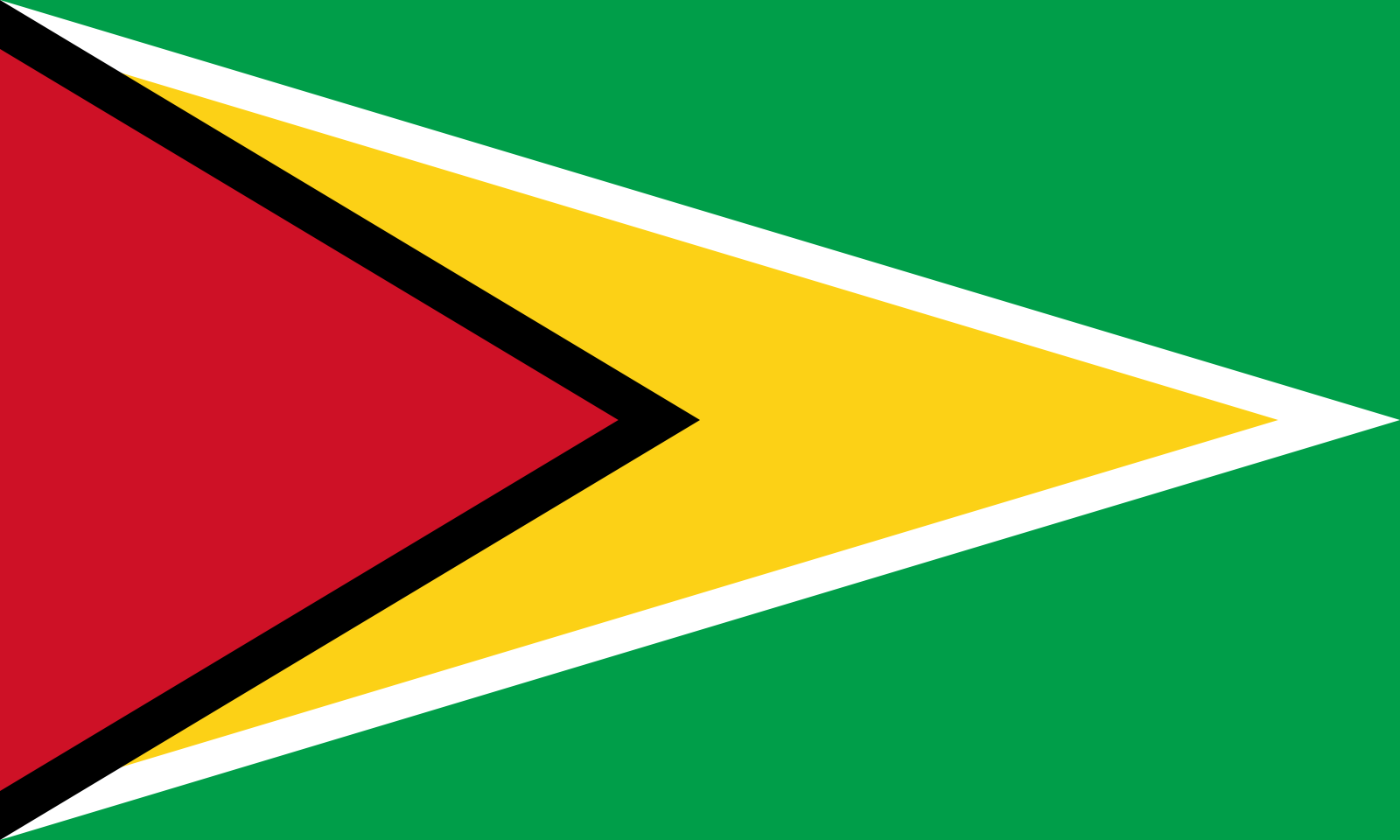 travel to Guyana
travel to Guyana
Guyana is situated in the north side of South America, it limits with Venezuela to the west, with Surinam to the east, with Brazil to the south and with the Atlantic Ocean to the north. Guyana, whose name means “land of many waters”, is the third smallest country of South America. The capital is Georgetown, located on the east littoral.The territory is formed by three large regions: the coastal zone, whose part west of the Essequibo River is claimed by Venezuela; the mountainous area of the interior, located to the west and claimed by the Venezuelan government; and the plains area in the east of the country.
The official language of Guyana is English, although other languages such as Creole, Hindi and other Indian languages are spoken in a minority way. The main composition of its population is of oriental origin, in addition to Africans, mestizos and Amerindians.
This small country has an exquisite natural heritage due to its jungle flora and fauna. The Kaiateur Falls, located in the centre of Guyana, are undoubtedly a spectacle of nature worthy of contemplation. The fall of the water that creates a rainbow and the blush of the fauna that inhabits it make these waterfalls one of the most impressive in the world. In the interior of the country we can visit the Iwokrama jungle, place of numerous and exotic species and where excursions are made throughout the year.
The Mount Roraima, shared with Venezuela and Brazil, is the highest summit in Guyana, 2,810 meters high and 10 kilometres long. It can be seen from afar while visitors make excursions through the jungle, and the most experienced adventurers can climb its peak in several days.
Guyana does not stand out precisely because of its paradisiacal beaches, although its coasts are bathed by the Caribbean Sea. Even so, Beach Shell is an essential destination for animal lovers. There the arrival of the turtles that choose this beach to lay their eggs takes place. Turtles usually come in mid-spring for eggs to hatch during the month of August. You can also see other species such as toucans, monkeys, jaguars and manatees, among many others.
The Rupununi savannah is in the southern part of the country, it is characterized by its wide plain of dry grass with hills somewhat more populated with vegetation. In this region you can spot native species such as jaguars, harpy eagles and other flora and fauna. Indigenous tribes and ranches inhabit it.
Guyana is undoubtedly a very attractive country for those lovers of flora and fauna who want to discover its Amazonian biodiversity. This country exploits a tourism mainly of nature and adventures very varied, since it gives us the possibility of exploring great plains, mountain ranges, long rivers, springs and jungles of great beauty. Its infrastructures in the process of development make this country a promising ecotourism provider.
REQUIRED DOCUMENTATION
The traveller must have a valid passport. For those visitors from certain territories, they require a visa to enter Guyana. If you have not been able to obtain a visa from a consulate in Guyana, you will be given one upon arrival in the country.
For more information about obtaining a visa, see the following address: http://www.guyana-tourism.com/index.php?option=com_content&view=article&id=3&Itemid=5
EMBASSIES AND CONSULS: https://www.embassypages.com/guyana
PRINCIPAL AIRPORTS OF GUYANA
- Cheddi Jagan International Airport, in Georgetown (Codex GEO)
- Ogle International Airport, in Georgetown (Codex OGL)
- Kaieteur International Airport, in Kaieteur National Park (Codex KAI)
- Linden Airport, in Linden (Codex SYLD)
- Lethem Airport, in Lethem (Codex LTM)
practical information
useful information before leaving
Language
Religion
Political regime
Currency
Warnings
Documentation
Vaccines
recommendations
Recommendations before traveling to Guyana
SECURITY
Always use the transport services offered by tourist accommodation and other authorized public facilities.
If you intend to make flights within the country, make use of regular flights as they pass regular security checks.
Hire tourist services with internationally recognized travel agencies.
Do not show jewellery, technological devices, and other high value possessions on the street.
There are exchange houses and recognized banks where currency exchange.
Avoid wandering the streets at nightfall.
Make a photocopy of your passport and keep the original in a safe area of the hotel.
Send a relative or acquaintance a copy of the itinerary to be made and contact numbers if necessary.
In case of making an excursion or activity, do it with guides and authorized monitors.
Do not feed or touch animals unknown to you. Some animals may react violently and cause injuries that can lead to serious infections.
In case of scratching or biting an animal, immediately contact a doctor.
The authorities recommend that visitors avoid areas such as the Buxton / Lusignan and Bartica regions.
Homosexuality in the country is considered illegal and is punishable by imprisonment.
HEALTH
Have a comprehensive medical and travel insurance, especially if you are going to do outdoor activities.
The yellow fever vaccine is COMPULSORY. Authorities may require a vaccination certificate before entering the country, and some airlines may also require it, especially if they intend to travel to Panama or Jamaica.
If you are pregnant, it is strongly recommended not to travel to Guyana due to the proliferation of the Zika virus. This disease can cause serious defects in the foetus. Zika is also transmitted sexually, so it is recommended to use condoms during your stay in the country.
Wear long-sleeved shirts and long, baggy trousers, as well as use mosquito repellent and close bottles or soda to avoid the proliferation of such insects.
Drink bottled mineral water and avoid buying food on the street and without disinfecting.
Due to the high temperatures in Guyana, try to stay well fed and hydrated, as heat shocks can be deadly.
CLIMATE AND TEMPERATURES
Its climate is mainly tropical and its temperatures remain constant throughout the year (between 73 and 86ºF). There are two periods of rainfall: the first period between May and mid-August, the second period in mid-November and ending in mid-January.
BUSINESS HOURS
Business hours are usually from 08:30 to 17:00 on weekdays, and Saturdays from 08:30 to 12:00. Many supermarkets open every day of the week.
TIPS
It is expected to tip if the client has received a good service.
ELECTRICITY
The voltage is 240 volts and the frequency is 60 Hz. The supported plugs are types A, B, D and G.
TELEPHONES OF INTEREST
The phone code is +592.
Some telephones of interest are: firemen (912); police (911); Coast guard (+1 592226-8488) and ambulance (913).
TIME ZONE
UTC-4.

